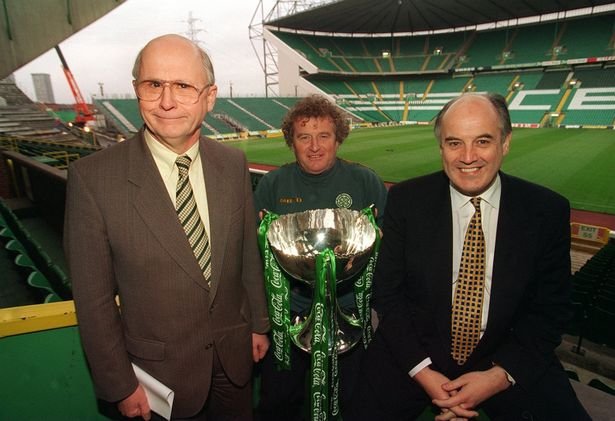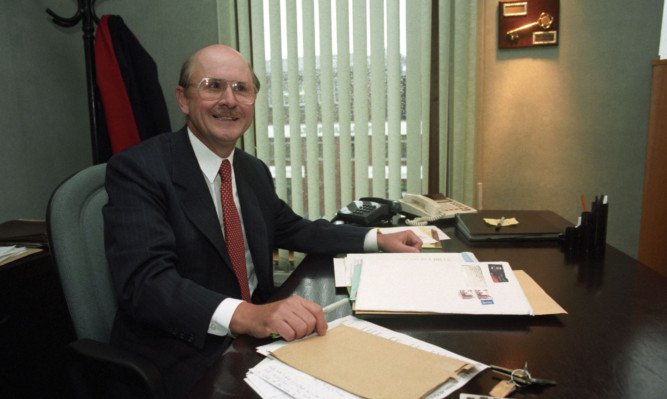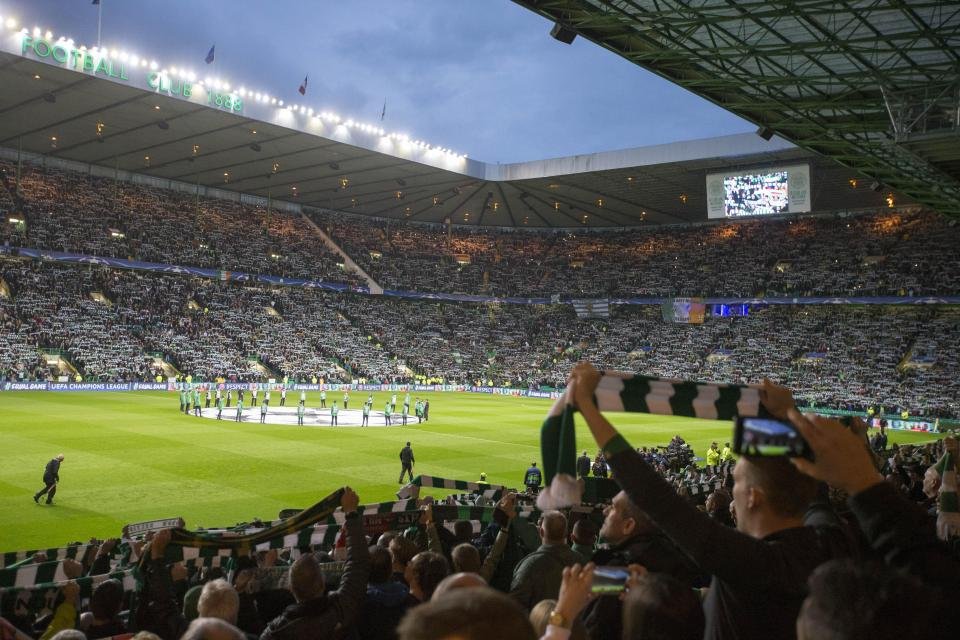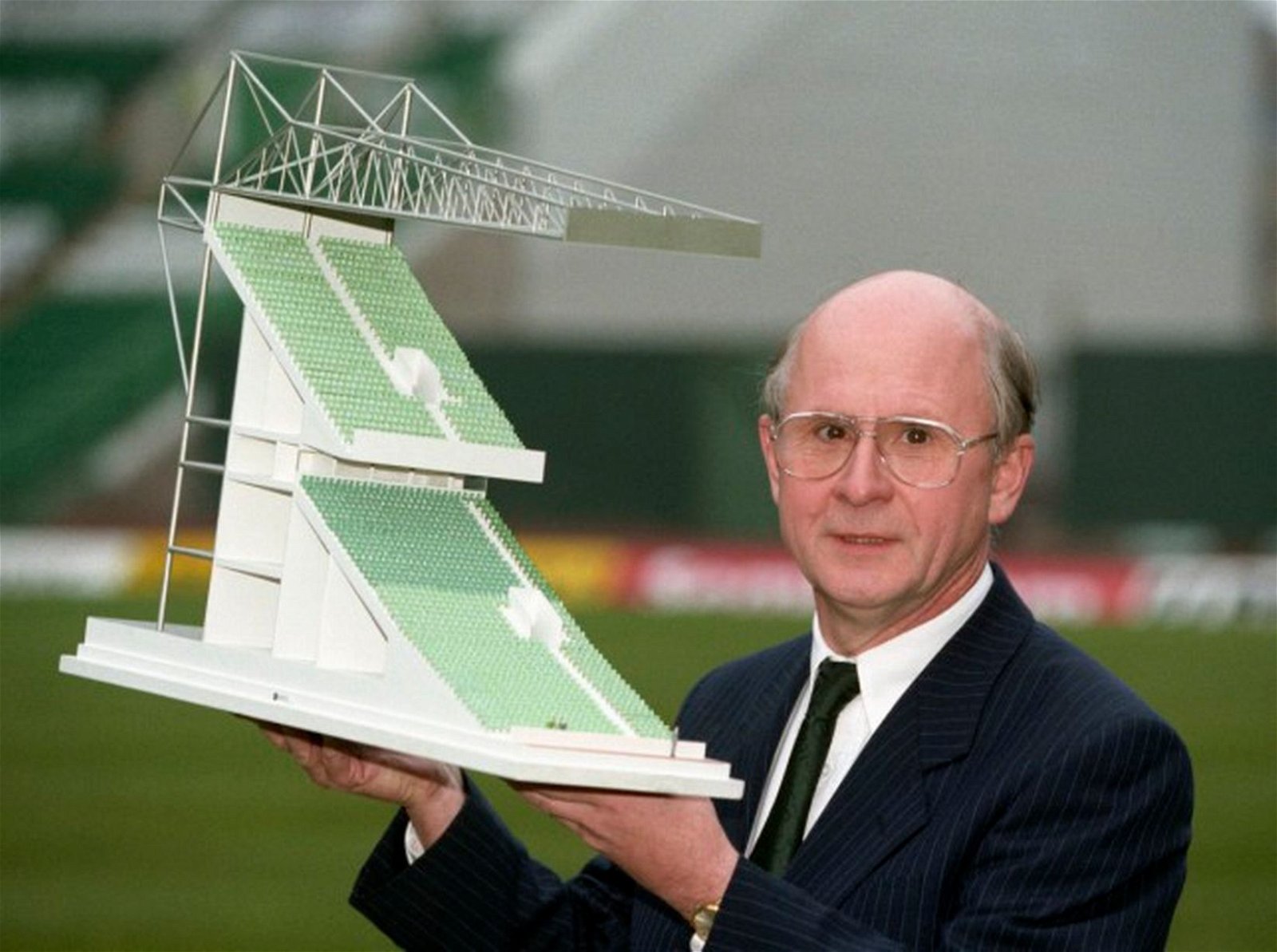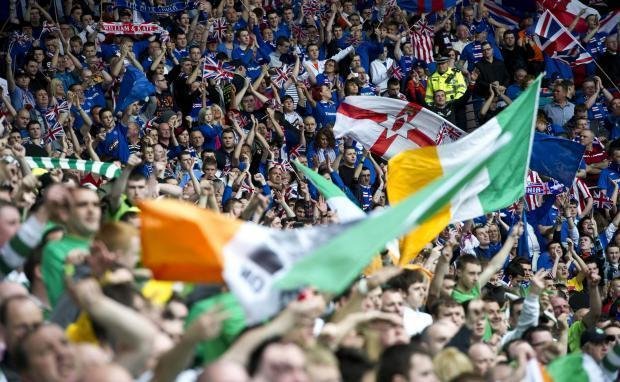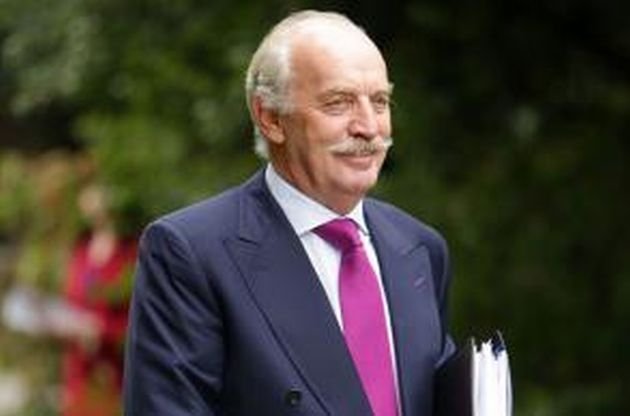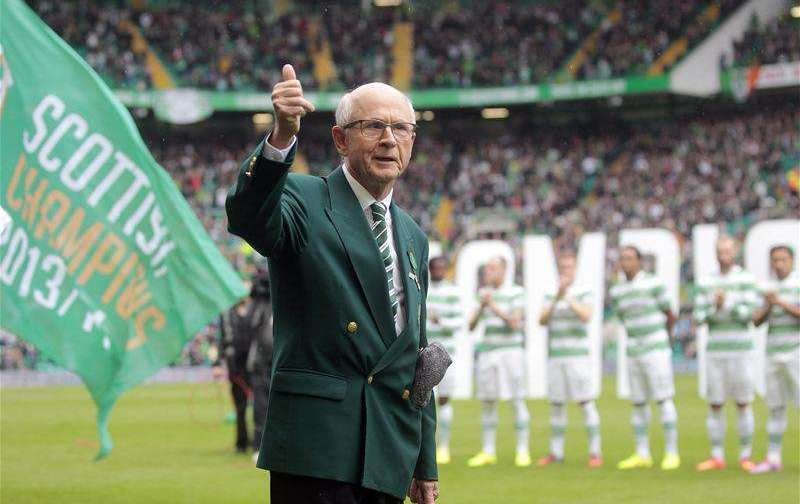Of all the straws to which Sevco fans cling, my favourite is the notion that all the club needs is a man like Fergus McCann, a man to recognise the inherent greatness in the club, buy in with his own money, clean out the boardroom, overhaul the dressing room, appoint the right manager, rebuild the infrastructure and restore them to glory.
It takes almost total ignorance to believe that this could happen to them.
There is no prospect of it at all, and I say that with no equivocation.
Time will not prove me wrong about it.
I am not going to find myself sitting in despair and wondering how I ever misread the landscape so badly. I can write it with the confidence of a dictator running for “re-election” in a country with a state owned media and no opposition parties. It’s not a bet if it’s a sure thing.
Fergus McCann worked a wonder at Celtic, but he did not work a miracle. Understanding that is the first key to all this; Fergus simply did a good job, within parameters he set for himself right at the start. He had a five-year plan, and he saw it through.
This is an examination into the Fergus Theory … and a demolition job on it.
First Things First, Sevco Doesn’t See Past This Ten In A Row Thing.
Fergus McCann came to Celtic Park with a five-year plan. He did not come to Celtic Park with a three year plan, and that’s how close Rangers were to the dreaded number. You cannot understand Fergus without understanding that above and beyond everything else. Fergus knew that it was important to win a league, but it wasn’t the be all and end all.
For Sevco, stopping ten in a row has become the all-encompassing fixation. It influences everything, from signing policy to managerial selection. When we secure title eight the frustration level will go sky high. Win nine and there will be a bloodbath over there.
Fergus hired Tommy Burns because he believed Burns would work tirelessly in pursuit of the goal. But Tommy’s goal was stopping the nine. He gave everything to it, and that’s what Fergus came to realise. Tommy was too emotionally invested. Fergus knew that if it was going to happen he needed someone who could maintain some distance, and approach it in a detached way. Hence bringing in a guy like Wim Jansen, with no connection to our club and who could disengage from all the hype and just focus on doing the job.
In the boardroom, Fergus had a different job. He was rebuilding the whole club. He realised it might not yield a league flag before being completed. He didn’t let that influence him.
A lesser man, one who cared about that stuff, would have changed the plan to accommodate unfortunate circumstances; at Ibrox Van Hooijdonk, Cadete, Di Canio and others might have got hefty wage rises just for threatening to go when their opponents were on the brink of making history, but Fergus stuck to his guns because he realised that sticking to the strategy was where the long-term benefits would be.
We didn’t always like it. Fergus got booed unfurling his league flag; it was a shameful moment, but I can see it now through the prism of the times. There was no online community to counter the appalling media inspired perception of the man. People believed what they read, and they read that this was a guy who actually lacked vision and clarity … utter nonsense, as time and circumstances have borne out in spades. We didn’t always get what he was trying to do. It’s only now that we see it for what it was. It grounded us. It prepared us for a reality that much of football still refuses to embrace. It was visionary. It was a kind of genius.
And it took amazing courage, and self-belief. Can you imagine being the man, flying in the face of media negativity, hostility wafting out of Ibrox, the sneering of Murray … and then being booed by your own fans? To keep on going through it, to never alter the plan, to move forward regardless … I never cease to be amazed when I look back on it.
At Ibrox, everyone blows in the prevailing wind. The slightest pressure can knock them off course. Fergus himself might have folded the hand faced with the ridiculous over-reaction and grotesque over-expectation amongst that support. The plan (if you can call it that) changes every five minutes and never seems to get better.
The focus on stopping ten in a row is pure blindness, and it’s way past the point where they can tell the fans that such things don’t matter in the long run. Even Fergus would never have told the fans that it wasn’t a big deal … but as amazing as this will sound, he’d have been right if he had. Because we had survived a near death experience and had a whole club to build and an overwhelming focus on that would have set that job back years.
Sevco crawled out of Rangers’ grave. The whole structure at Ibrox was levelled. They started in the bottom tier. The task of putting that together would have taken a decade even without all the false turns and bad choices. What they needed more than money and ego was a sense of realism about that in the boardroom … and through all the turmoil and the turnover and the coups and the bloodshed, they haven’t got it yet.
How clear was Fergus’ vision?
Well, his revolution paid off in just three years and he did it without indulging the whims of various parties or pandering to either the supporters or greedy players and agents. King and his board has already had three years, and they’ve wasted so much money already that the debts are piling up around them and there’s no end to the chaos in sight.
Celtic Was Running At A Fraction Of Its Potential … And Still Outperforming Rangers.
Fergus McCann knew two things about Celtic in the 1990’s, and I didn’t learn the second of them myself until I watched Paul Larkin’s documentary The Asterisk Years.
First, Fergus knew that Celtic was not operating at its peak and that there were a hundred ways of turning us into a better company, which could make more money. And he knew that in spite of that, the club was capable of turning a profit.
Because in spite of £7 million in total debts we had been doing that for the better part of a decade whilst Rangers posted losses year on year.
I give Fergus credit for a lot of things, but putting his money into Celtic was a no-risk deal. He knew it could come off. He had done the sums. He knew the stadium could be funded and how. He knew the team could be strengthened because of the increase in revenue. He knew the feel-good factor could be leveraged into big money. He knew the White’s and the Kelly’s lacked the imagination to see what he could. He knew he was onto a winner.
Take Celtic Park; it was a dilapidated relic at a time when even St Johnstone had a 10,000 all-seater ground. He knew that technological advances meant that building stands, and even whole stadiums, was cheaper than most people were aware and that the emotional pull of our ancient home meant that it was better to develop that than start from scratch elsewhere. If he didn’t know that Ibrox’s unique design meant that filling in the corners would be prohibitively expensive he would have soon enough.
He knew a bigger ground meant more money.
That 10,000 seat differential has been vital to our amassing of wealth and power, just as he knew it would be.
In the modern era of £500 season tickets it translates into an advantage of roughly £5 million every year. And it’s been twenty odd. … perhaps as much as £100 million more than they’ve been able to spend, even adjusting for inflation.
Sevco certainly does not have the money to change that, and with a full season ticket base and sales near the top of their capability they are operating at almost full speed. And their turnover ranges from between £40 million to £60 million behind ours. Would you believe that even in the early days, when our plans were still being realised, there was never a differential that big? This is an historic finance gap, one we never, at any point, had to bridge.
By the time Peter Lawwell took on the CEO role at Parkhead we had established an operational capacity in excess of theirs. I have written about it many times. From around 2000 onwards, we overtook Rangers in turnover terms and the only years we ever fell below it were two in which we had no European football and they did.
The challenge Fergus took on was cake compared to this.
Football Was Still Seen As An “Investment” Back Then. 2008 Changed Everything.
There was a time, back in the 2000’s, when football teams were seen as a great thing for people to put their money into.
It was before Sky’s TV deals went nuts, before wages and transfer fees sky-rocketed.
It was when Celtic could buy an English international striker for £6 million.
Things had not gone so turbo.
Things had not gone so nuts.
It was before Leeds leveraged their future for Champions League money they never got.
It was before the crash in 2008 which stopped banks who had tolerated all this in their tracks.
It was before Murray was uncovered as a charlatan and his football revolution widely recognised to have been built on debt. It was not the only one.
Jack Walker had sugar-daddied Blackburn to an EPL title and pushed up the prices in the process. His death dropped them three divisions. In Scotland, Brooks Mileson took Gretna from the lower leagues to the SPL and a Scottish Cup final before his own death obliterated it all and put them out of business. Dundee, Motherwell, Livingston and Dunfermline, to name a few, joined a slew of clubs in England in going into administration.
As all this was going on, Dermot Desmond spoke for a generation of top financial people who were getting their fingers burned by the game when he told a Celtic fan delegation who wanted him to finance glory with his own cash that “I’d be as well piling it up in the garden and setting fire to it.” It was a realisation dawning on a lot of people across Europe.
I am not convinced that football was ever a profitable “investment” but it was easier to make that case twenty years ago than it is today, where it’s impossible. Fergus took a club that was not operating at peak, with a rundown infrastructure, and rebuilt it … he sold up his shares and made a profit, a big one. He was one of the very few, and he was only able to do it because he left behind something vastly more valuable than what he bought.
And something that was profitable to boot.
That’s what appealed to guys like Dermot Desmond in the first place; Celtic was an emotional purchase, yes, but it was also a stable one. He did see it as an investment, but only insomuch as that the shares he bought would hold their value. He never intended to play the sugar-daddy.
He knew what he was buying, and what he wasn’t, and whilst I know that if Celtic found itself in trouble the first thing he’d do is write a cheque, I know that the second thing he’d do was sack Peter Lawwell for allowing it.
(Thanks to Phil for that line! I knew I’d find a place for it!)
To get people to “invest” in the Ibrox basket case the club would need to be capable of turning a profit.
Now, as it happens, I think Sevco could turn a profit. But it would mean slashing costs. And that would mean dropping this “going for 55” nonsense for a long while. And that would cost them season ticket sales … and that would mean even more cutting.
But if you want a quick way of sussing out who is talking arrant nonsense about what Sevco needs and who has a firmer grasp on reality, look out for the term “investing in the team.” There is no “investing” in football teams and there never was. Fergus didn’t build a team, he built a club and that’s why he made a profit on it. Charles Green bought the bits of a club. He glued them together and sold up. That’s how he managed to do it.
The rest is just nonsense.
Fergus Didn’t Use His Money. He Used Ours. Ibrox Fans Won’t Go For That.
Here’s where Sevco’s biggest problem is; they want someone else to do the heavy lifting.
Did you read those fan group statements the other day? They wanted the board to put more money up or to move aside for someone who will. They haven’t sussed that any solution worth a damn will have to come from them, and from their own pockets.
This is one area where King sometimes tells the truth, but because he’s always disguising it in general bluster and coached in the language of supremacy it never quite percolates. Fergus didn’t do that at all. He arrived at Celtic with a plan, and the most empowering thing about that plan is that he told the fans they would need to step up and do their part … and because he spelled it out to us and gave us the blueprints to examine we bought right in.
I bought my first season ticket for the opening of the North Stand. My father bought shares on top of his. Supporters flocked to that share issue because it gave us a stake in our club and we could see exactly where the money was going … it was, quite literally, rising out of the ground.
I remember going to one of Fergus’ presentations; I remember placing my own hands on the model of the ground, as he envisioned it.
That was so exciting you had to be part of it.
It makes me proud to see Parkhead today, because it gives you a sense that you helped to make it happen.
This is one of the reasons why the vast majority of Celtic fans, when polled, don’t support sugar-daddy ownership or any model wherein one person bankrolls the club. What happens if that person decides not to? What if that person decides he can’t? What if, as in the case of Blackburn and Gretna, that person is no longer around?
Sevco fans, on the other hand, were run by one of those guys for so long that an entire generation of them knows nothing else. The last couple of share issues at Ibrox have been undersubscribed, forcing directors and owners to buy the bulk of them. David Murray famously “underwrote” £50 million worth of shares after fans made it clear that they weren’t going to purchase them and Charles Green ran to his mates when it became clear that Sevco’s share issue was going to flop without “institutional” buyers … and who were they? The fact one of them is wanted by Interpol should give you a hint as to their bona fides.
Celtic’s share issues had explicit purposes behind them.
One was to build the stadium, one was to fund the training ground, one was a recapitalisation exercise … the reasons for them, the precise destination of the money, was spelled out clearly. Sevco has not had a share issue since Green, but even it was an exercise in smoke and mirrors.
Sevco fans don’t want to fund the club; they could not have made that clearer this weekend if they tried, in their furious finger pointing at King and his board. They want someone else to do it. They want someone to come in and buy them success.
If Celtic fans had been so unreasonable not only would Fergus never have succeeded, he would never have come near the place to start with. Anyone who wants to get involved in Sevco knows that’s exactly what the fans want, and you don’t have to go back far to see how they treat those who fail to deliver.
They don’t inspire confidence, far less sympathy.
Who but “one of their own” would want to come near them?
And that’s the next problem.
Fergus Did Not Have To Detoxify Celtic Before He Marketed It. (But He Tried To.)
Here’s the irony; Fergus McCann tried to make Celtic friendlier to investors by attempting to rid the stands of all the Irish stuff. Yet the very people who later came on-board knew what they were buying into, and part of it was our Irish heritage.
But I always understood – although I never completely agreed with – what Fergus tried to do. It wasn’t really about removing the Irish element; he knew that was part of us and even essential if his plan was to succeed. But the Republicanism worried him and I understand why he thought it needed to be downplayed; he wanted to expand our appeal, our fan-base, by marketing us as a “club open to all.” And in that he succeeded.
Part of it was launching the Bhoys Against Bigotry campaign, which was roundly mocked by the Scottish media – one hack complained about “the proactive H” – and by David Murray, who shamefully said that Scottish football would always have sectarianism and that it would be unrealistic (and even daft) to try and change it. Years later, he brazenly tried to say he’d suggested the campaign to Fergus in the first place … a ludicrous suggestion when you saw how little progress his own club had made in tackling the issue.
Fergus was a marketing genius. The Celtic Family concept comes from his time, and that sense of community was a huge boon to us. If filled the stands. It continues to fill them. The club is seen, around the world, as a friendly, open, socially liberal, responsible one … and that is all to the good. We have a wonderful reputation and image.
In order to even market Sevco a huge task faces anyone who takes it on; there is a burning need to detoxify the brand. One of the worst mistakes they ever made, in taking on the identity of Rangers, was that it necessitated the importing of all the poison that had plagued that club for eons. Had they accepted they were starting from scratch they could have written a new story, on a new page. They can never do that now.
Born in disgrace and shame, the first thing much of the world heard from them was an allegation that sectarianism played a role in their plight … and people heard that and now place it in the context of the club itself and have associated the word with them ever since.
Do you know how difficult it is to completely transform the perceptions people have about you? Especially when those perceptions are formed over a long time?
My political interests bring me back to the decades long task of trying to shed the Tories image as “the nasty party”, and they went backwards on that one. Even short-term issues can be nearly impossible to erase in people’s minds. It’s why Ed Miliband couldn’t break through and why Jeremy Corbyn is finding it hard to.
The perceptions people outside the club have about Sevco are almost entirely negative. Marketing them within the UK is notoriously hard because of that. If it’s not the latent sectarianism in the stands it’s the arrogance and self-entitlement of fans who have driven banks, businessmen, even billionaires from the door for keeping them from their rightful place. It’s a belief in conspiracy theories and an acute paranoia.
And it has a lot to do with taking the name of a club that dumped tens of millions in debts after being liquidated in a tax fraud … and which then put a tax cheat in the chairman’s office. The legal arguments, fights with sponsors and manufacturers and such like simply adds more colour to a picture that’s already pretty clear.
And all this before we get to the promotion of Ulster Loyalism, Britishness days, militarism and their cultural jamboree in Linfield.
Fergus knew there were risks to the Bhoys Against Bigotry campaign.
If our support had actually had hardcore bigots in it, he knew they were a tiny number.
He wanted to cut them out like a cancer before they multiplied.
If Sevco was to get real about the same kind of thing now, to save the club long-term by making it marketable, it would empty their stands and put the whole institution in grave existential peril. They are stuck with this problem.
Fergus Surrounded Himself With Realists. Sevco Prefers Fantasists.
Fergus was a pragmatic man who did what great leaders do. He started with the destination he wanted to reach and he planned backwards. That has two benefits; the first is that it keeps things simple. It gives you a blueprint to follow. The second is that if you start with vague ideas and far-out goals and try to build towards them it starts to get like chasing dreams. It allows people flights of fancy and leads to wrong-headed solutions when problems arise.
To execute even a well-thought out plan you need people around you who know every stage of it and believe in what you’re doing. And because Fergus had a clear path in mind he was able to entice serious minded people to help him put the pieces together.
Don’t think for a minute that Fergus did not have a few fantasists around him. One individual, who was widely tipped to be chairman, had no interest in following the roadmap and wanted to forego investment in infrastructure to sink money into the team. Fergus was not impressed with such grandstanding and especially not when there was no actual money from said individual on the table. That was only ever going to end with a parting of the ways.
He broadened the makeup of the board, and put hard-nosed businesspeople on it. Desmond joined because he loved what Fergus was about, and that kind of gravitas on the board led even more impressive names to get involved.
A guy like Dave King will never attract high calibre individuals; that leaves you with people like Alastair Johnston, a guy who thinks Lloyds should have done what the real banks do and written off all Rangers’ debts to them. You get guys like John Gilligan. You get the last people in Scotland who don’t realise that King is a brazen sod who will use anything, even emotional blackmail, to get them to part with money. You get guys like Paul Murray giving lectures to accounting conferences whilst running one of the most dysfunctional companies in the country.
Start out with the proposition that Sevco is a huge club that “needs” to be challenging Celtic, that it “needs” to be spending money, that Scotland “needs” it to be successful, that it can be sustained at the same level as Rangers was (without it dawning on anyone that Rangers circled the drain and swirled down the plughole) and who but fantasists do you think you are going to get? These people are nuts, and you can tell that because of what they believe in.
To bring anyone onto that board, you first have to convince them to leave reality at the door and embrace this rampant nuttiness. Serious people won’t do that. Serious people will not sign off on a plan that amounts to if’s, but’s and maybe’s.
That’s not a blueprint to success. It’s a map to the graveyard.
There Is No Sevco Version Of Fergus, And It’s Impossible To Imagine Them Finding One.
Celtic was ripe for a man like Fergus. It had fans who were ready to embrace his kind of vision, after so many years without one. The fans were hard-headed realists. They cared enough to see things through and they had never been spoiled by high-spending owners. Fergus played it straight right from the start; he came and met the fans and spoke to them and laid it out for them. I know because I went to one of the nights he did.
He did not fill our heads with nonsense. He did not do hand-holding. He showed us what he wanted to do and he told us that without our support it was impossible. And that was empowering. That inspired confidence. He did not divert from the plan he was following, no matter the pressure. He was rebuilding the whole club, he had bigger concerns and bigger motivations than stopping a run of league wins somewhere else. He saw the big picture.
Men like him do not come along every day, and he would never have bothered to had he not known it could work and had he not known we would get it.
Start from the basis that King and his board are not going to make the grade at Ibrox; it’s a reasonable assumption because if they were we’d know by now. What does an incoming board have to work with? A club running at maximum capacity and earnings. A club that is widely regarded as a basket-case and so won’t attract outside financing. A club with unrealistic expectations, a scandalised institutions name, a fan base with appalling proclivities and ideologies and which has no patience for hearing negative messages.
The task will take millions; many, many more millions than Fergus had to spend. The fans won’t pay for it because they don’t see why they should. They are so used to someone else picking the tab up that the very idea of it is loathsome to them.
They don’t have a Fergus right now, and they are not going to find one.
Another avenue of hope has been denied to them, and closed off.
Things have changed too much for it … and what’s changed over there, in spite of their willingness to believe in fairies with buckets of money, is that they are at last coming into contact with reality. That hasn’t quite hit them yet, but it will.
